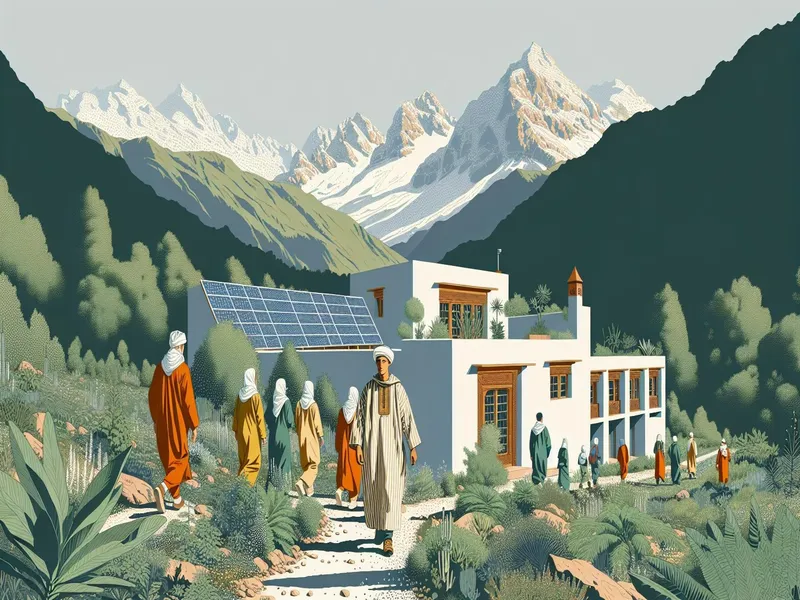
Whether you’re drawn to the Sahara’s vast dunes or Morocco’s vibrant souks, this region provides countless opportunities to explore while minimizing your environmental footprint. You’re likely searching for ways to experience these wonders responsibly, and I’m here to guide you through it.
Ignoring eco-friendly practices can lead to negative impacts on these beautiful landscapes. Over-tourism and irresponsible travel behaviors threaten fragile ecosystems and local communities. It’s crucial we make conscious choices now so future generations can also enjoy these treasures.
I’ve spent years exploring North Africa with an eye toward sustainable travel. From eco-lodges in Tunisia to community-based tourism projects in Egypt, I’ve seen firsthand how small changes can make a big difference. My goal is to share practical tips that align with your passion for both travel and conservation.
Whether you’re a seasoned traveler or new to eco-tourism, you’ll find valuable insights tailored just for you. By adopting sustainable practices, you not only enrich your own experiences but also support the preservation of North Africa’s natural beauty and cultural heritage.
So let’s jump into how you can begin on an unforgettable, eco-friendly journey across North Africa. For more ideas on enriching activities during your travels, check out our comprehensive guide.
Overview of Eco Travel
Eco travel, or “ecotourism,” is all about exploring new places while keeping Mother Earth happy. It’s like being a guest in someone’s home—you wanna leave it just as nice (or nicer) than when you arrived. North Africa’s got some pretty epic spots that are perfect for this kind of mindful travel.
What Makes Eco Travel Special?
Eco travel focuses on sustainability and conservation. Think of it like this: imagine visiting a stunning beach but making sure not to leave any trash behind, so the next person can enjoy its beauty too. In North Africa, there’s a huge emphasis on protecting fragile ecosystems and supporting local communities.
Real-Life Example: Morocco’s Green Initiatives
Morocco’s been stepping up its game in eco-friendly tourism. They’ve got eco-lodges popping up everywhere from the Atlas Mountains to the Sahara Desert. These places use solar power, recycle water, and even offer organic food grown right there on-site. Staying at one of these lodges feels like you’re making a difference without sacrificing comfort.
Hypothetical Scenario: Your Trip to Tunisia
Imagine you’re planning a trip to Tunisia. Instead of staying at a regular hotel, you opt for an eco-friendly option—maybe an ecolodge near El Haouaria with views of the Mediterranean Sea. You spend your days kayaking around sea caves and learning about local marine life from guides who live there year-round.
Why Choose Eco Travel?
- Reduce Impact: By choosing eco-friendly options, you’re helping reduce your carbon footprint.
- Support Locals: Money spent often goes directly into local economies.
- Unique Experiences: You get to do cool stuff like stay in treehouses or go on guided nature walks led by locals with tons of insider knowledge.
Personal Anecdote: My Time in Egypt
I remember my visit to Siwa Oasis in Egypt—a hidden gem surrounded by desert dunes and salt lakes. I stayed at an eco-lodge called Adrere Amellal where everything was built using traditional methods and materials. There were no electric lights; instead, they used beeswax candles which gave the place such an incredible ambiance at night.
Top Eco-friendly Destinations in North Africa

Exploring eco travel in North Africa is like discovering hidden gems. You can protect the planet while diving into rich cultures and stunning landscapes. Let’s check out some top spots that blend adventure with sustainability.
Morocco
Morocco offers an array of eco-friendly options that’ll make any traveler feel good about their trip. One standout is the Atlas Kasbah Ecolodge in Agadir, which uses solar panels and organic farming to reduce its environmental footprint. When I stayed there, I felt connected to nature without sacrificing comfort.
- Atlas Mountains: Home to several eco-lodges promoting sustainable tourism.
- Essaouira: A coastal town known for windsurfing and initiatives to protect marine life.
- Marrakech: While bustling, it has hidden riads (traditional guesthouses) committed to green practices.
Egypt
Egypt’s not just about pyramids and pharaohs; it’s also a hub for eco-conscious travelers. Siwa Oasis stands out with its mud-brick buildings and salt lakes, offering a unique way to experience the desert sustainably. During my visit, I marveled at how locals preserved their environment while maintaining a rich cultural heritage.
- Siwa Oasis: Known for eco-lodging and natural springs.
- Red Sea Coast: Dive resorts here focus on coral reef conservation.
- Fayoum: Offers eco-tours around Lake Qarun and Wadi El Rayan waterfalls.
Tunisia
Tunisia may surprise you with its commitment to sustainability. Dar Hi in Nefta is an ecolodge that blends modern design with traditional Tunisian elements, using renewable energy sources. Imagine lounging by the pool knowing your stay supports local artisans and minimizes environmental impact!
- Dar Hi Ecolodge: Features geothermal heating and cooling systems.
- Djerba Island: Promotes responsible tourism through community projects.
- Ichkeul National Park: A UNESCO World Heritage Site focused on protecting wetlands.
Algeria
Algeria might be off the beaten path but it’s worth exploring for its untouched beauty and growing ecotourism sector. The Tassili N’Ajjer National Park offers guided tours emphasizing conservation efforts while showcasing stunning sandstone formations. My trek there was both awe-inspiring and humbling as we learned about preserving these ancient wonders.
- Tassili N’Ajjer National Park: Rich in prehistoric rock art; promotes sustainable tourism.
- El Kala National Park: Focuses on biodiversity preservation; great for bird-watching.
- Ghardaia: An oasis town practicing traditional water management techniques.
Sustainable Travel Practices

Choosing to travel sustainably in North Africa can make a significant difference. Let’s jump into some practical ways you and I can explore this beautiful region while keeping our environmental footprint light.
Eco-friendly Accommodations
Finding eco-friendly places to stay isn’t as hard as it sounds. In Morocco, for instance, I stayed at the Atlas Kasbah Ecolodge. This place is amazing! They use solar power, practice organic farming, and even recycle water. It’s like staying in an oasis of sustainability.
- Look for lodges that use renewable energy
- Opt for accommodations with waste recycling programs
- Choose places that source food locally
In Tunisia, the Dar Hi Ecolodge stands out with its contemporary design and commitment to sustainability. If you’re ever there, give it a try—it’s not just good for the planet but also a unique experience.
Green Transportation Options
Getting around green doesn’t mean sacrificing convenience or fun. When I visited Egypt’s Siwa Oasis, I took advantage of local bicycles and electric tuk-tuks, reducing my carbon footprint while enjoying the scenery up close.
- Use public transportation like trains and buses
- Rent bicycles or electric scooters for short distances
- Share rides through carpooling apps if available
Imagine cruising through Algeria’s Tassili N’Ajjer National Park on an e-bike—it’s both thrilling and eco-friendly!
Responsible Wildlife Tourism
Interacting with wildlife responsibly ensures these incredible creatures remain part of North Africa’s charm for generations. On my trip to the Red Sea Coast in Egypt, I joined a certified diving tour that emphasized respect for marine life.
- Choose tours led by certified guides who follow ethical practices
- Avoid attractions where animals are kept in captivity or mistreated
- Support conservation projects aimed at protecting endangered species
Picture yourself snorkeling near coral reefs without disturbing their delicate ecosystems—how cool is that?
By adopting these sustainable travel practices, we can enjoy North Africa’s wonders while preserving them for future explorers.
Activities for Eco-conscious Travelers
Eco travel in North Africa offers a ton of activities that blend adventure with sustainability. Whether you’re into hiking, exploring cultural sites, or volunteering, there’s something here for every eco-conscious traveler.
Hiking and Nature Trails
North Africa is a hiker’s paradise. Imagine trekking through the majestic Atlas Mountains in Morocco. I once hiked there and was blown away by the stunning landscapes and diverse ecosystems. It’s not just about the views; these trails help protect local flora and fauna by promoting responsible tourism.
For those who prefer coastal scenery, Tunisia’s Cap Bon Peninsula offers breathtaking cliffside walks. These hikes also provide opportunities to learn about local conservation efforts firsthand.
Cultural and Heritage Tours
Exploring North Africa’s rich history can be done sustainably too! I remember visiting ancient Roman ruins in Algeria – it felt like stepping back in time. Many tours now focus on minimizing environmental impact while maximizing cultural immersion.
In Egypt, you can join eco-friendly tours of Cairo’s historic districts and even take part in workshops on traditional crafts. These experiences support local artisans while reducing your carbon footprint.
Volunteer and Community Projects
If you’re looking to give back during your travels, North Africa has numerous volunteer opportunities. A friend of mine spent two weeks at an organic farm in Morocco, helping with sustainable agriculture projects. It was a transformative experience that gave deeper insights into local life.
Consider joining community projects on Djerba Island in Tunisia where you can assist with beach clean-ups or educational programs for kids. These initiatives not only benefit the environment but also foster meaningful connections with locals.
By engaging in these activities, you’re not just a visitor; you’re contributing to preserving North Africa’s natural beauty and cultural heritage for future generations.
Challenges and Opportunities
Eco travel in North Africa offers incredible experiences but comes with its own set of challenges and opportunities. Let’s jump into some key aspects.
Environmental Concerns
When we talk about eco travel, it’s impossible to ignore the environmental issues. North Africa’s fragile ecosystems face threats from over-tourism, pollution, and climate change. For instance, popular spots like the Atlas Mountains suffer from trail erosion due to heavy foot traffic. It’s crucial we minimize our impact by sticking to marked trails and supporting conservation programs.
Another concern is water scarcity. In places like Egypt’s Siwa Oasis, water sources are limited and need careful management. By choosing accommodations that practice water conservation—like using low-flow showers—you help protect these precious resources.
Local Community Engagement
Engaging with local communities transforms your trip into a meaningful experience. When I stayed at the Dar Hi Ecolodge in Tunisia, I joined a pottery workshop run by locals. It was eye-opening to see their craftsmanship while directly supporting their livelihoods.
You can also participate in community projects. Think of it as giving back while you travel: volunteering on sustainable farms or joining beach clean-ups on Djerba Island makes a real difference. These activities not only benefit the environment but also strengthen ties between travelers and residents.
Future Prospects
The future of eco travel in North Africa looks promising yet challenging. There’s growing interest in sustainable tourism; but, infrastructure needs improvement to support this trend fully. Imagine how solar-powered transportation could revolutionize how we explore desert landscapes without leaving a carbon footprint!
Governments are slowly recognizing this potential too—initiatives like Algeria’s focus on conserving Tassili N’Ajjer National Park show progress. With continued effort from both authorities and responsible travelers like us, eco travel can flourish while preserving North Africa’s natural beauty for generations to come.
Summary
Eco travel in North Africa offers an incredible opportunity to explore a region rich in culture and natural beauty while prioritizing sustainability. From Morocco’s eco-lodges to Tunisia’s community projects each destination presents unique ways to experience the local environment responsibly.
By choosing eco-friendly accommodations and activities we can significantly reduce our carbon footprint and support local economies. Engaging with local communities through volunteering or sustainable tourism initiatives adds depth to our travels making them more meaningful.
Let’s embrace the promise of eco travel ensuring that our adventures contribute positively to conservation efforts. Together we can preserve North Africa’s stunning landscapes for future generations while enjoying unforgettable experiences along the way.